|
|
|
Sort Order |
|
|
|
Items / Page
|
|
|
|
|
|
|
| Srl | Item |
| 1 |
ID:
015842
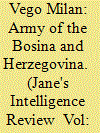

|
|
|
|
|
| Publication |
Feb 1993.
|
| Description |
63-67
|
|
|
|
|
|
|
|
|
|
|
|
|
|
|
|
| 2 |
ID:
142273
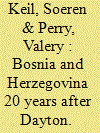

|
|
|
|
|
| Summary/Abstract |
It has been 20 years since the Dayton Peace Agreement (DPA, official name: General Framework Agreement for Peace in Bosnia and Herzegovina) ended the bloodiest war in Europe since World War II. The violent conflict and the peace agreement demonstrated many of the tectonic changes that Europe and the world as a whole went through after the end of the Cold War. First, the wars highlighted the inability of the European Community (after 1993 European Union (EU)) to end the conflict, because of its Member States' disagreement on strategies and options, including the threat of military intervention, and the brilliant recognition and manipulation of this wavering by Balkan leaders. Reflecting this European discord, the DPA secondly highlighted the importance of the United States as the only remaining superpower capable of decisively intervening to end the violence in Southeastern Europe. The perception of a weak EU and a strong US willing to use military force would be further strengthened when NATO, significantly led by the US, intervened in the Kosovo war in 1999. Third, the war, and the consequent peace agreement also highlighted that the end of the Cold War by no means resulted in an end of violent conflict in Europe and beyond. Francis Fukuyama's thesis of the “End of History” and the victory of capitalism and democracy proved to be wrong, shortly after it was formulated. Finally, the war in Bosnia and the resulting peace agreement raised new discussions about the drivers of political violence and conflict, the role of ethnicity in democratic systems and institutional options available to overcome such wars and build and consolidate democracies.
|
|
|
|
|
|
|
|
|
|
|
|
|
|
|
|
| 3 |
ID:
142274
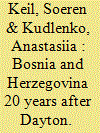

|
|
|
|
|
| Summary/Abstract |
This article will start with an analysis of the Dayton Peace Agreement, and assess to what extent it focused on peace-building, state-reconstruction and democratization. It will provide an overview of major peace-building, state-reconstruction and democratization initiatives by international and local actors in post-war Bosnia. Following the often-presented argument that ‘Dayton is a good peace agreement but a bad blueprint for a democratic state’, the article will ask if the Dayton Peace Agreement has failed in the consolidation of Bosnian statehood and the democratization of the country. In order to do this, an in-depth analysis of the current situation in terms of state consolidation and democratization will be given. The main argument of the article demonstrates that while the Dayton Agreement had some inherent weaknesses, actions by local elites and international state-builders also explain some of the current issues of the Bosnian state.
|
|
|
|
|
|
|
|
|
|
|
|
|
|
|
|
| 4 |
ID:
056571


|
|
|
| 5 |
ID:
093886
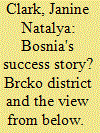

|
|
|
|
|
| Publication |
2010.
|
| Summary/Abstract |
Situated in the far northeastern corner of Bosnia and Herzegovina, Brcko District is widely heralded as a successful multi-ethnic society. Such portrayals are typically 'top down' and centred on institutions, yet it cannot be assumed that multi-ethnicity at the institutional level necessarily translates into everyday relations between Brcko's ethnic groups. Based on qualitative interview data, this article explores Brcko from the 'bottom up', through a focus on inter-ethnic relations in everyday life. Its central argument is that viewing Brcko through this additional lens not only raises important questions about the District's image as a success story but also, and more broadly, has significant implications in highlighting the limitations of liberal peacebuilding and the importance of 'peacebuilding from below'.
|
|
|
|
|
|
|
|
|
|
|
|
|
|
|
|
| 6 |
ID:
116355
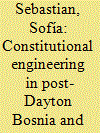

|
|
|
|
|
| Publication |
2012.
|
| Summary/Abstract |
This article reflects on the dynamics associated with state building in post-conflict Bosnia and Herzegovina (BiH) with a particular focus on the role of external agency. The debate over constitutional reform has featured prominently in BiH since the early 2000s. The objective of this reform was to transform Dayton into a functional institutional framework that prepared the country for both international withdrawal and EU integration. Based on a detailed analysis of two international initiatives launched in 2005 and 2009 this article analyses the reasons why constitutional engineering in post-Dayton BiH failed. More specifically, the article argues that this reform failed as a result of various shortcomings including international divisions; a democratic deficit inherent in the process; and the neglect of local conditions (including conflicting notions of the future form of the state by both local and external actors).
|
|
|
|
|
|
|
|
|
|
|
|
|
|
|
|
| 7 |
ID:
142275
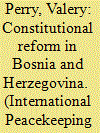

|
|
|
|
|
| Summary/Abstract |
This article considers Bosnia and Herzegovina (BiH)'s constitutional reform path options following the 20-year anniversary of the Dayton Agreement that ended the war. The need for substantive structural and constitutional reform has not gone away, and there is an open question on whether and how Euro-Atlantic integration processes might influence reform outcomes. First, a brief review of constitutional reform efforts to date is presented. Second, arguments for and against constitutional reform in BiH are summarized. Next, some characteristics of federal and confederal systems are introduced to frame discussions on BiH decision-making capabilities, and the role of the state vs lower levels of government. This includes a discussion on the issue of a BiH ‘coordination mechanism’ to manage EU integration, and whether or not the state might need some sort of supremacy clause. The article closes with some musings on the apparent trajectory of the country. The case of BiH is not sui generis, and can contribute to the literature and potentially influence policy-makers interested in the implementation and possible re-negotiation of peace treaties and constitutions – issues relevant to any countries emerging from divisive, violent conflict.
|
|
|
|
|
|
|
|
|
|
|
|
|
|
|
|
| 8 |
ID:
103217
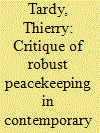

|
|
|
|
|
| Publication |
2011.
|
| Summary/Abstract |
The concept of robust peacekeeping emerged in response to the failures of the UN in Rwanda and Bosnia and Herzegovina, where peacekeepers were passive witnesses of massive violations to human rights, allegedly because they were not 'robust enough'. Although robust peacekeeping is not a new concept and has been partially implemented in some operations (Sierra Leone, Democratic Republic of Congo, Haiti, Lebanon), it attracted renewed attention in 2008-10 with developments in its conceptualization. While it recognizes the necessity and virtue of a robust approach as a protection mechanism for peacekeepers, this article questions the extent to which robust peacekeeping is politically acceptable and operationally viable. Beyond the doctrinal difficulty of ensuring compatibility of robustness with the principles of peace operations, robust peacekeeping is directly challenged by the perennial constraints of contemporary peace operations, such as weak political support, the erratic availability and quality of troops, and the reticence of troop contributors to embrace a robust approach. Overall, while robustness is presented as a solution to the 'credibility gap' that the UN faces, its relevance in the light of these problems is dubious.
|
|
|
|
|
|
|
|
|
|
|
|
|
|
|
|
| 9 |
ID:
104281
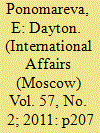

|
|
|
|
|
| Publication |
2011.
|
| Summary/Abstract |
Dayton, Ohio, is home to a U.S. Air Force base and undoubtedly one of the symbols of the new world order. Alongside Brussels, The Hague, Strasbourg, and Rambouillet, it is associated with redealing out cards of History and reestablishing rules of the political game. You will recall that the General Framework Agreement for Peace in Bosnia and Herzegovina (Dayton Agreement) was initialed on November 21, 1995. The Agreement went into effect on December 14, 1995 after its signing in Paris. Its guarantors were the USA, UK, France, Germany, and Russia. The coming into force of this Agreement put an end to the armed confrontation in Bosnia and Herzegovina in 1992-1995; it separated the warring sides and set apart territories of the Republika Srpska and the Muslim-Croat Federation.
|
|
|
|
|
|
|
|
|
|
|
|
|
|
|
|
| 10 |
ID:
053653
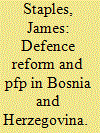

|
|
|
| 11 |
ID:
116356
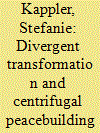

|
|
|
|
|
| Publication |
2012.
|
| Summary/Abstract |
This article problematizes the EU's approach to conflict transformation in its neighbouring countries, with specific reference to Bosnia and Herzegovina. It claims that the way in which the EU engages with domestic elites differs considerably from its engagement with the grassroots - an interaction that is heavily reliant on cooperation with civil society. This in turn produces a process of divergent transformation, creating further cleavages between elites and citizens. Emerging centrifugal processes obstruct the development of a common political platform for the citizens and represent an obstacle to the creation of a social contract in the peacebuilding context. This undermines the possibility of achieving sustainable peace and results in the transformation of past conflict into new conflict.
|
|
|
|
|
|
|
|
|
|
|
|
|
|
|
|
| 12 |
ID:
139367
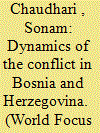

|
|
|
|
|
| Summary/Abstract |
Due to the changing nature of Conflict, establishment of internal security in post conflict societies is a major challenge for the international players. The Bosnian conflict has played a very important role in the international security scenario. It provided the chance to the international actors to show their peacekeeping and conflict management capacity in a war situation.
|
|
|
|
|
|
|
|
|
|
|
|
|
|
|
|
| 13 |
ID:
116354
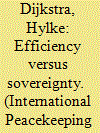

|
|
|
|
|
| Publication |
2012.
|
| Summary/Abstract |
This article analyses why the UN's members delegate resources to the UN Secretariat in the sensitive field of peacekeeping. It argues that the Secretariat can carry out planning and implementation functions more efficiently, but that the states remain wary of potential sovereignty loss. Through a mixed methods approach, this article provides evidence for such a functional logic of delegation, but shows that it only applies from the late-1990s on. The change in approach of states towards delegation can be explained by feedback from the dramatic failures of peacekeeping in Bosnia and Herzegovina, Rwanda and Somalia.
|
|
|
|
|
|
|
|
|
|
|
|
|
|
|
|
| 14 |
ID:
053104
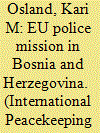

|
|
|
| 15 |
ID:
101433
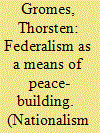

|
|
|
|
|
| Publication |
2010.
|
| Summary/Abstract |
As federalism offers a compromise between a unitary state and secession, it plays a prominent role in agreements on terminating civil wars between ethnically-defined parties to the conflict. This article examines the impact of federalism on peace-building in postwar Bosnia and Herzegovina. It argues that in the chosen case federalism in conjunction with a consociational democracy, peacekeeping troops, and the prospect of integration into the European Union brought about a partial success of peace-building. Although the federal system did not work well, it seems plausible that Bosnia and Herzegovina would be worse off with a unitary state or a partition.
|
|
|
|
|
|
|
|
|
|
|
|
|
|
|
|
| 16 |
ID:
084587
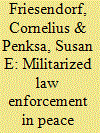

|
|
|
|
|
| Publication |
2008.
|
| Summary/Abstract |
The militarization of law enforcement has been a major feature of post-cold war international security: domestically, at borders and as part of peace operations. In post-war interventions, international military forces are confronted with tasks ranging from crowd and riot control and the arrest of suspect war criminals to the fight against organized crime. This article analyses and explains the militarization of law enforcement in Bosnia and Herzegovina, with a focus on the European Union Force (EUFOR). After taking over from NATO's Stabilization Force (SFOR), which had gradually and reluctantly become involved in law enforcement, EUFOR expanded counter-crime efforts. In its second term, EUFOR scaled down such engagement. We explain these dynamics by pointing to three interrelated factors: the role of individuals, the evolution of regional institutions and changing perceptions of crime and the rule of law.
|
|
|
|
|
|
|
|
|
|
|
|
|
|
|
|
| 17 |
ID:
084056
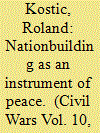

|
|
|
|
|
| Publication |
2008.
|
| Summary/Abstract |
Building a durable peace by means of external nationbuilding can be a cumbersome and uncertain exercise. The outcome often hinges on the attitudes of the local population and elites and their willingness to endorse the process. This article scrutinises the attitudes of the recipient population and political elites towards different aspects of the external nationbuilding in Bosnia and Herzegovina. It addresses the problems of state identity, reconciliation and democratisation in an externally administered nationbuilding endeavour. The empirical findings from Bosnia and Herzegovina are used to illustrate the degree to which external nationbuilding can lay the infrastructure for a durable peace in the aftermath of ethnic war.
|
|
|
|
|
|
|
|
|
|
|
|
|
|
|
|
| 18 |
ID:
158502
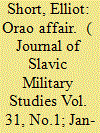

|
|
|
|
|
| Summary/Abstract |
Following Dayton, three ethnocentric armies remained in Bosnia and Herzegovina, presenting a significant obstacle to the consolidation of the multi-ethnic Bosnian state. This article examines the development of the separate armies and the reform process that ultimately unified them. It will contend that such progress would not have been possible without the political fallout that followed the revelation that a Bosnian company had been conducting trade with Iraq in contravention of a UN embargo prior to the 2003 invasion. Faced with the threat of international sanctions, local and international actors moved rapidly to overhaul the defense sector, resulting in the military integration of the three armed forces and the creation of a single army answerable to the Bosnian state.
|
|
|
|
|
|
|
|
|
|
|
|
|
|
|
|
| 19 |
ID:
052441
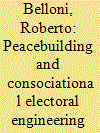

|
|
|
| 20 |
ID:
019047


|
|
|
|
|
| Publication |
March 2001.
|
| Description |
139-162
|
|
|
|
|
|
|
|
|
|
|
|
|
|
|
|
|
|
|
|
|